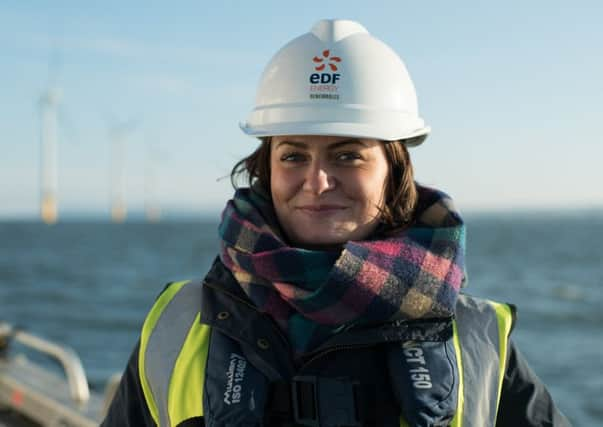Engineering careers in STEM jobs is Claire's ambition


The 30-year-old from Giffnock is a renewable energy research engineer with EDF Energy and is six months away from completing her PhD at the University of Edinburgh.
She candidly admits its a profession still dominated by men and is speaking out in a hope to encourage more women to purse careers involving the STEM subjects - science, technology, engineering and maths.
Advertisement
Hide AdAdvertisement
Hide AdOnly 36 per cent of science graduates are female, 10 per cent lower than males, despite girls outperforming boys at school.
The number of girls studying computing, physics, biology or chemistry at Higher level in Scotland has also dropped markedly over the last 10 years.
That’s despite a jobs boom in the STEM sector. Industry estimates suggest that 640,000 jobs will need to be filled across the UK in the next six years, including 52,355 north of the border.
“Girls at a young age are deciding science isn’t for them,” Canning said. “But it wasn’t until I entered engineering that I really noticed the gender gap. In my team there’s two women and 15 men. EDF are trying to change that. We have to get the message out that is not just for boys.”
Canning herself was a late convert to engineering, having grown up with ambitions of working as a marine biologist.
“When I graduated from St Andrew’s I struggled to get a job,” she said. “I went down the marine conservation route at Exeter University but even then finding paid work was difficult. I couldn’t go on working voluntary roles. Some people fund themselves but I wasn’t in a position to do that.
“A couple of years later I was working with Glasgow City Council in the customer care centre, but I really wanted to go back into science.
“I came across this engineering doctorate programme in offshore renewable energy, looking for people from a wide variety of backgrounds. You didn’t need to be an engineer or a physicist. I applied knowing it was four years and would be quite heavy going. I would be effectively starting from scratch.
Advertisement
Hide AdAdvertisement
Hide AdI applied thinking I wouldn’t get anywhere with it but now I have six months left of the course. Time has gone very quickly.”
Canning was at an advantage, having studied marine science, but the finer points of engineering were still new to her.
She also had the added worry of telling friends and family that she would be embarking on another degree when some were asking when she would get “a proper job”.
“I was worried, she said. “I sat down with the director of the course and they told me they thought I could bring something different to the table. I was the only marine biologist that had applied and won a place -they were interested in having that different perspective, someone who doesn’t necessarily do engineering every day and has more biology skills.
“Before the course started they did recommend I spend some time going back over my Advanced Higher maths course, brush up on some physics, so when I started the course I was little bit more prepared.
“I’ve been given a lot of support. They want you to succeed. “
Canning’s job now takes her from working in the North Sea to EDF’s research laboratories in France.
The energy giant recently opened a renewables office in Edinburgh and the sector is one she has a passionate interest in.
Advertisement
Hide AdAdvertisement
Hide Ad“I submit my thesis in August and then after that I’m hoping there will be more opportunities with EDF.
“It’s an exciting thing to be a part of. I’m very proud Scotland is so supportive of the industry.”